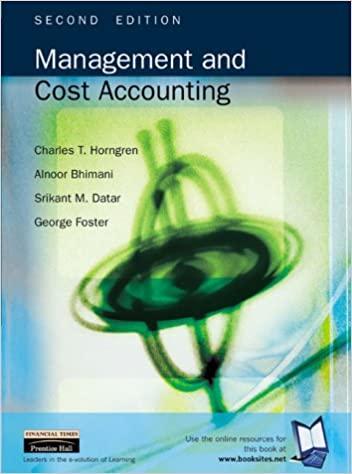Question
1. Imagine you are a purchaser for a large foodservice company. Two potential purveyors want your business. Both offer similar product lines and similar pricing.
1. Imagine you are a purchaser for a large foodservice company. Two potential
purveyors want your business. Both offer similar product lines and similar pricing.
How do you handle this situation to get the best results for your company?
2. Which approach, the perpetual or periodic inventory method, appeals more to you?
Why?
3. A fine-dining restaurant has been making every- thing from scratch for the five
years it has been open; it is the only operation in the area known for scratchcooking. The management hires a new chef who does a makebuy analysis only
to discover that she can get much better pricing on many of her products if she
buys them premade. After a tasting comparison, she discovers that the premade
products are of high quality and taste only slightly different from her own. Should
she switch to the premade products? Would your answer be different if this
decision took place when the restaurant first opened?
4. A chef locates a premade tuna salad that is nearly identical to the one she makes
from scratch in her sandwich shop. To make it from scratch, an $8.25/ hour
employee needs 20 minutes to prepare the tuna salad. The ingredients cost $12.18
and yield ten 4-oz servings. The chef can purchase the pre- made tuna salad at
$26.99 for a 5 tub. Calculate the cost per portion for the scratch-made and the
premade versions. If cost were the only factor, should the chef make or buy this
product?
5. What three factors are most important when selecting a purveyor?
6. Describe the difference between open bidding and sealed bidding.
7. A purchaser uses the periodic inventory method and orders food every two weeks.
Her chef needs 220 sugar for the next two weeks and, per company pol- icy, she
must target to have 50 sugar left in inventory at the end of the two weeks. If she
currently has 70 sugar on hand, how many pounds of sugar should she order? If
the sugar comes in 25 bags, how many bags does she need to order?
8. A purchaser uses the perpetual inventory method. Her chef requests a par stock
of 200 sugar because the chef uses 23 of it each and every day. The purchaser
needs to place an order two days in advance of delivery with her dry goods
purveyor. Her chef also requests a one-day supply of all nonperishables be treated
as a safety netthats a 23 safety net for the sugar. From this information,
calculate the reorder point and reorder quantity for sugar.
Step by Step Solution
There are 3 Steps involved in it
Step: 1

Get Instant Access to Expert-Tailored Solutions
See step-by-step solutions with expert insights and AI powered tools for academic success
Step: 2

Step: 3

Ace Your Homework with AI
Get the answers you need in no time with our AI-driven, step-by-step assistance
Get Started


